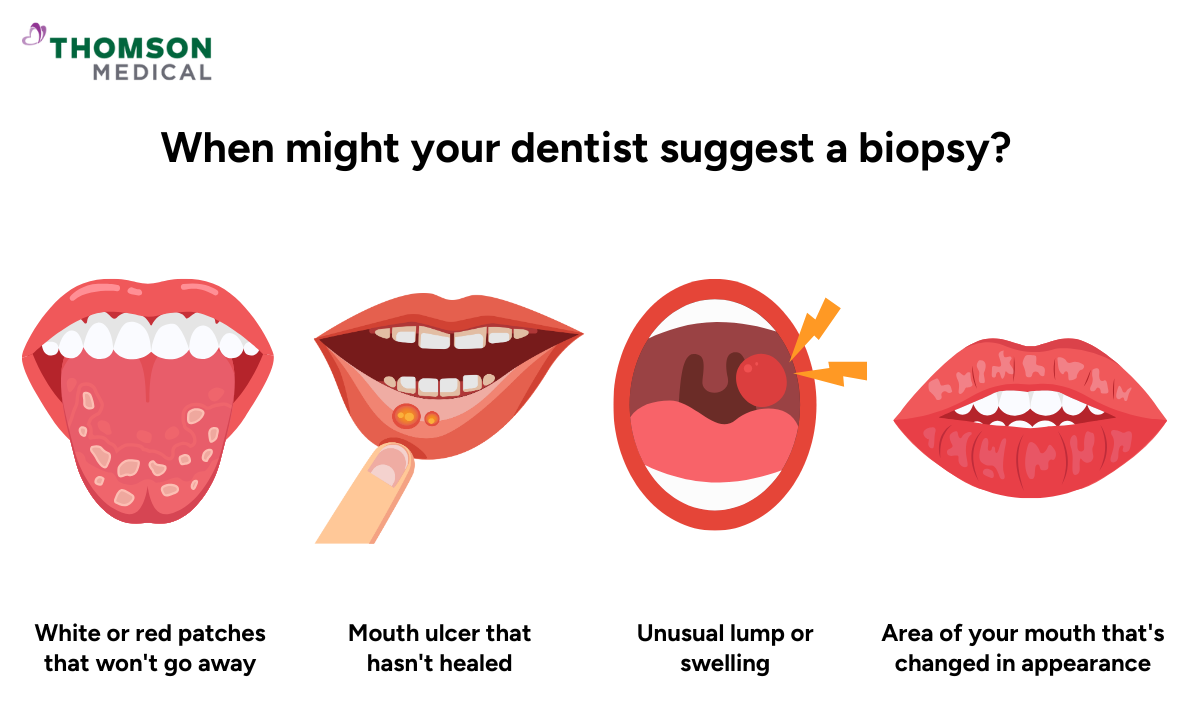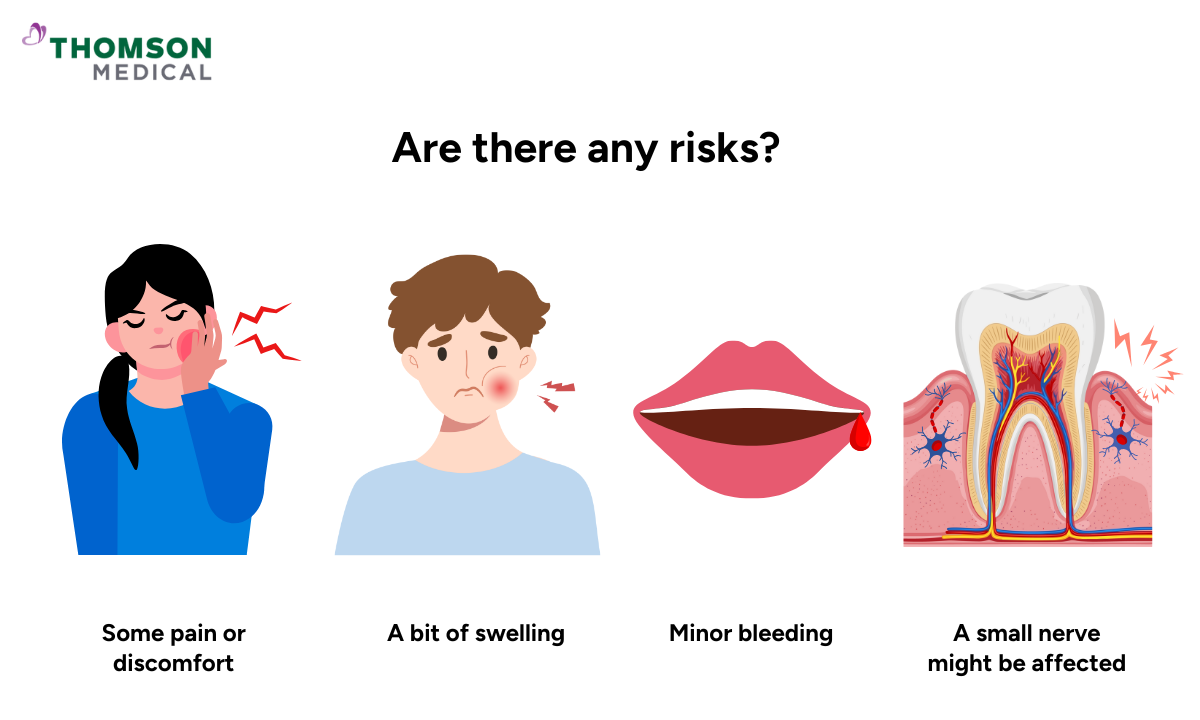“You need an oral biopsy." When your dentist says these words, your stomach drops. Will it hurt? How long will you be waiting for answers?
If you're feeling anxious right now, you're not overthinking it. An oral biopsy can feel daunting when you don't know what to expect. The good news? Most results show harmless changes, and the procedure itself is far less intimidating than it sounds.
What is an oral biopsy?
An oral biopsy helps your dentist find out what’s causing any unusual changes in your mouth. When they notice a patch, lump, or sore that doesn’t look normal or isn’t healing, the biopsy helps identify what it really is.
During the biopsy procedure, your dentist removes a tiny tissue sample from the area in question. This sample then goes to a laboratory where experts examine it under a microscope. It's the most reliable way to understand what's causing the change in your mouth and, most importantly, to catch any problems early when they're easiest to treat.
When might your dentist suggest a biopsy?

Your dentist might recommend a biopsy if they notice something during your examination that needs a closer look. This could be something you've spotted yourself or something they've found during a routine check-up.
You might need a biopsy if you have:
White or red patches that won't go away
A mouth ulcer that hasn't healed after a few weeks
An unusual lump or swelling
Any area of your mouth that's changed in appearance or texture
Needing a biopsy doesn't mean something serious is happening. Most biopsy results show harmless, non-cancerous changes. A biopsy is simply the most accurate way to find out what’s going on, so you can get the right care if needed. It also helps catch serious conditions like oral cancer early, when treatment is most effective.
Dental specialist in oral biopsy
Loading...
What are the different types of biopsies?
Your dentist will choose the type that's best suited to your particular situation. They'll also explain which one they're planning to use and why. Here are the main types:
Brush biopsy:
This is the gentlest option, where cells are collected using a specialised circular brush from a lesion in the mouth.
Punch biopsy:
A small, circular tissue sample is removed from the oral cavity using a circular blade tool.
Incisional biopsy:
Your dentist removes only a small part of a larger area. This is usually done when the lesion is bigger than 1 cm and too large to remove completely, or when there is a higher concern that it could be something serious.
Excision biopsy:
The entire affected area is removed when it is smaller than 1 cm and appears benign during the clinical examination.
Aspiration biopsy (fine needle aspiration):
A sample of the cells from the affected area is collected using a needle and syringe.
Whichever type your dentist recommends, they've chosen the approach that will give the most accurate results while being as gentle as possible.
If you're unsure which biopsy is right for you, request an appointment with Thomson Medical. Our dental specialists will assess your condition and recommend the safest, most appropriate option.
Will it hurt?
While many people are concerned about the pain they might feel from an oral biopsy, the procedure itself is normally painless.
Before starting, your dentist will give you a local anaesthetic injection to completely numb the area. Though you may feel a slight pinch when the injection is given, once it's taken effect, you won't feel any pain during the biopsy itself.
The whole process usually takes about 15 minutes from start to finish. Your dentist will carefully remove the tissue sample and, in most cases, close the area with a stitch or two. These are usually dissolvable stitches that disappear on their own after about two weeks, so you won't need to come back to have them removed.
How should you prepare?
Before your biopsy, you'll have a discussion with your dental specialist. They'll ask about your medical history, any medications you're taking, and whether you have any allergies. This helps them tailor the procedure to you.
Depending on your situation, they might ask you to:
Temporarily stop taking certain medications
Avoid eating for a period before the procedure (if sedation is needed)
Have some dental x-ray imaging or a CT scan if the biopsy involves bone
Just before the procedure begins, you'll be asked to rinse your mouth with an antibacterial mouthwash. This helps keep the area clean and reduces the risk of infection.
What happens after an oral biopsy?
Once your biopsy is done, you'll be able to go home fairly quickly. The local anaesthesia will wear off after a few hours, and you might feel some mild discomfort similar to biting your cheek. Simple painkillers like paracetamol or ibuprofen usually help manage any discomfort.
Looking after yourself on day one
The first 24 hours require a little extra care, but nothing too demanding:
Stick to soft foods such as soup, yoghurt, mashed potato, or smoothies. Hot foods can cause bleeding
Avoid rinsing your mouth or spitting forcefully, as this can loosen the blood clot that is helping your wound to heal
If your stitches are in your tongue or lip, try to keep talking to a minimum
Avoid smoking and alcohol for at least 48 hours
No vigorous exercise or heavy lifting today
You might notice an unpleasant taste in your mouth, but sipping water can help with this
From day two onwards
After the first day, you can start rinsing your mouth with warm salt water after meals. This is great for keeping the area clean and helping it to heal. Here's how to make it:
Add one level teaspoon of salt to a glass of hot water
Let it cool until it's comfortably warm
Gently swish it around your mouth, then spit it out
Repeat this process three times a day for about 5-7 days. You can then gradually return to your normal diet, although you may prefer to avoid crunchy or hard foods for a few days.
What about the stitches?
If you have dissolvable stitches (which most people do), they'll gradually dissolve over 10-15 days. You don't need to do anything, as they'll just disappear on their own. However, if you happen to have non-dissolvable stitches, your dentist will let you know and arrange for them to be removed.
What if there's bleeding?
It's completely normal to have a bit of blood-stained saliva after your biopsy. But if you notice more active bleeding when you get home, don't panic. Here's what to do:
Sit down and stay upright (this helps reduce blood flow to the area)
Take a clean cotton cloth or piece of gauze
Press it firmly on the bleeding area for a full 10 minutes without checking
If the bleeding continues after this, contact your dental team for advice
This approach almost always stops the bleeding. Your dental team is available to support you if you need further guidance.
Are there any risks?

As with any dental procedure, there are a few small risks to be aware of. You might experience:
Some pain or discomfort (usually mild and manageable)
A bit of swelling
Minor bleeding
In rare cases, a small nerve in the area might be affected
Your dentist will discuss any risks specific to your situation with you before you proceed. Remember that these complications are uncommon, and your dental team knows how to manage them if they happen.
If you’d like expert advice on recovery after an oral biopsy, request an appointment with Thomson Medical. Our specialists will explain each step and answer any questions about healing, pain management, or follow-up care.
When will you get your results?
This is often the part that causes the most anxiety, and it's understandable that waiting can be difficult. Results usually take up to six weeks to come back from the laboratory. That might seem like a long time, but the lab needs to examine your sample thoroughly to give you accurate results.
If your results are taking longer than expected, please don't assume the worst. Sometimes tests simply take a bit longer, and it doesn't necessarily mean anything is wrong. You can always contact your dentist's office for an update if you're feeling anxious.
FAQ
How long does it take to get the oral biopsy results?
Results typically take up to six weeks, though the timeframe can vary depending on your clinic or hospital. In some cases, your dental specialist may seek a second opinion to ensure the most accurate diagnosis, which could extend the waiting time slightly. If you're feeling anxious about the wait, don't hesitate to contact your dentist's office for an update.
Can you eat or drink after a biopsy?
Yes, you can eat and drink after your biopsy. For the first 24 hours, sticking to soft foods at cool or room temperature, like soup, yoghurt, mashed potato, or smoothies, works well. Avoid alcohol for at least 48 hours and stay away from hard or crunchy foods near the biopsy site. Your body needs proper nutrition to heal, so don't skip meals.
Is an oral biopsy painful?
You won't feel any pain during the procedure, just perhaps a brief sting from the local anaesthetic injection. Once the area is numb, you won't feel pain during the procedure, perhaps just some pressure. Afterwards, when the anaesthetic wears off, most people describe it as mild discomfort rather than pain. Over-the-counter painkillers usually handle it well, and it typically improves within a few days.
Are there any risks associated with oral biopsies?
Like any surgical procedure, there are some small risks involved. You might experience pain, bleeding, discomfort, or swelling. There's also a minimal risk that small nerves in the biopsy area could be affected. Your dental specialist will discuss any potential risks specific to your situation before the procedure.
How long does it take for an oral biopsy to heal?
The healing time depends on the type of biopsy performed. For a simple biopsy done under local anaesthesia without stitches, any pain or discomfort typically lasts around 2-3 days. However, depending on the location and complexity of the biopsy, complete healing could take up to two weeks.
Will there be much soreness or swelling after an oral biopsy?
Most people are pleasantly surprised by how little soreness or swelling they experience. The day after the procedure tends to be when you notice it most, but it gradually gets better from there. If you do have discomfort, it usually only lasts a few days.
The information provided is intended for general guidance only and should not be considered medical advice. For personalised recommendations and tailored advice, please consult a specialist at Thomson Medical. Request an appointment with Thomson Medical today.
Reference:
Jenzer, A. C., & Pepper, T. (2023, July 17). Oral surgery, biopsies. StatPearls - NCBI Bookshelf. https://www.ncbi.nlm.nih.gov/books/NBK594246/
